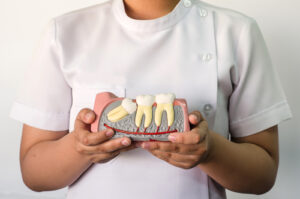What Are the Possible Problems with Erupting Wisdom Teeth?
 Wisdom teeth or third molars can emerge without any issues or complications and line up with the other teeth behind the second molars. They are likely to emerge between the ages of 17 and 25, although they might not emerge before a person has reached their 30s or even 40s.
Wisdom teeth or third molars can emerge without any issues or complications and line up with the other teeth behind the second molars. They are likely to emerge between the ages of 17 and 25, although they might not emerge before a person has reached their 30s or even 40s.
But wisdom teeth are notoriously known for being unpredictable bad boys. For the majority of people in Temecula and the surrounding areas, wisdom teeth eruption comes with minor or major complications, and they may have no other option than to seek the assistance of a Temecula wisdom teeth removal specialist.
Do wisdom teeth always hurt when they come in?
Erupting wisdom teeth can be painful, starting with a sensation of pressure in the area. Erupting wisdom teeth can also affect the surrounding gum tissue, causing inflammation, swelling or sensitivity. But although you may experience a certain level of pain and discomfort, you may also feel no pain at all. The best and safest course of action is to schedule an immediate consultation with an oral surgeon on whether to have you wisdom teeth removed.
How long do wisdom teeth take to come through the gum?
Wisdom teeth normally start to erupt between the ages of 17 and 25. However, the process does not happen at the same pace for everyone. In fact, it can take years for the wisdom teeth to fully emerge through the gums or they may never erupt at all.
It is important to have regular dental checkups in order to detect potential wisdom teeth complications such as impacted wisdom teeth early on. Even if your wisdom teeth are free of symptoms for the time being, there may be issues down the line, such as inadequate space for the tooth to erupt and demanding or complicated cleaning and maintenance routine. You could be spending a carefree day by the Temecula Duck Pond when you feel a sudden pang of pain, and your wisdom tooth could be the culprit.
Another reason for patients in late teenage years to schedule a consultation with an oral surgeon is to avoid serious complications which are far less likely in young adults than in older ones.
How long should wisdom tooth pain last?
Any kind of tooth pain is a clear warning sign: you may have an infection and you need to take immediate action to prevent possible complications. In the event that you experience any of the following signs and symptoms, there may be an issue with your wisdom teeth or they may be causing or exacerbating other dental problems:
- Jaw pain and tenderness
- Swelling under the jaw
- Having difficulty fully opening the mouth
- Sensitive, swollen, red or bleeding gums
- Bad breath
- Unpleasant taste in the mouth
If so, and if you want to avoid the risk of having to undergo difficult surgery and post-surgery complications. you need to consult an oral surgeon immediately, In the event that you do need to have your wisdom teeth removed, the duration of recovery will depend on the complexity of the procedure and the complexity of your condition. Discomfort following a wisdom tooth extraction typically lasts between 2 and 7 days.
We’ll guide you your Temecula wisdom teeth removal process

Wisdom teeth removal complications can be intimidating, which is why you need to have an experienced wisdom teeth specialist on your side. Welcome to a safe environment where Dr. Tsvetov will put your mind at ease. He will handle your case with patience in order to restore your dental health. Schedule your appointment now!
Comments are closed.

